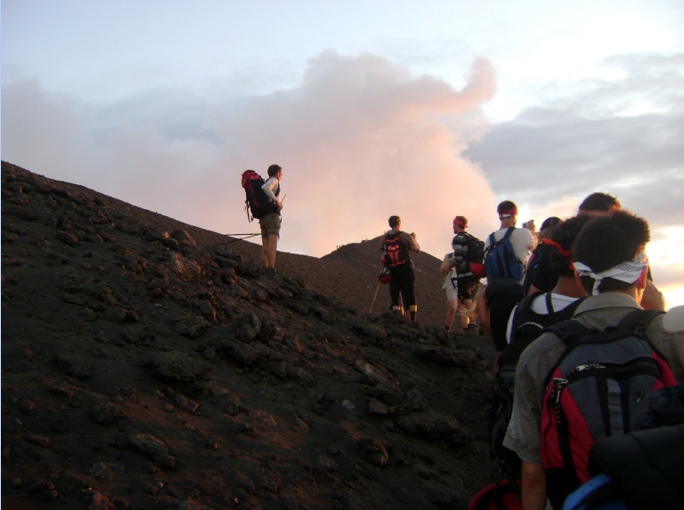Lab/Field Schools
Lab / Field Schools

Geology students climbing towards the summit of Italy’s Mount Stromboli, one of the world’s most active volcanoes, to observe its eruptions from a safe distance.
The Department of Geology offers students the opportunity to gain hands-on experience in the field, and about 50% of our undergraduate Geology program is taught in labs or in the field.
Here’s an example of what you can expect:
Field Methods
This course (GEOL 3300) introduces students to basic field techniques used by geologists. Students summarize in a geological report and map the field observations,measurements and interpretations that they gather during an eight-day field camp.
International Field School
The International Field School course (GEOL 4400) exposes students to geological features that cannot be found in Canada through international travel to locations like Italy and Greece. In practical terms, this course acquaints students with the modern methods of structural, stratigraphic, petrologic and/or geophysical analyses. After mastering these skills, students will undertake an independent geological report project.
In 2013, the course was offered in Italy, and over the course of two weeks featured visits to the following localities:
- The archeological sites of Pompeii and Herculaneum, to see the impacts of volcanic eruptions on ancient civilizations
- Mt. Vesuvius, a dormant volcano sitting next to the metropolitan area of Naples, to learn methods of identifying volcanic rocks in the field
- The island of Procida, to map geological cross sections through some of Europe's largest volcanic stratigraphic sequences
- The Campi Flegrei volcano, to see an active caldera heating a massive geothermal system
- The INGV Observatory in Naples, to learn about the methods of volcanic hazard monitoring and prediction
- Stromboli Island, to learn about eruptions styles and view real eruptions atop a ~1000 m stratovolcano
- Mt. Etna, to learn to recognize different types of geological land forms and see active eruptions of Europe's largest volcano